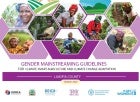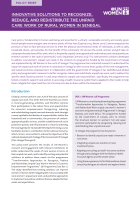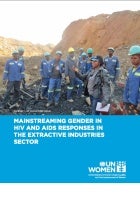1 - 5 of 5 Results
Date:
These guidelines seek to align the County Integrated Development Plans (CIDPs) with the Climate Smart Agriculture (CSA) and Climate Change Adaptation (CCA) policies, regulations and strategies for gender mainstreaming in Laikipia County. The guidelines were developed under the Economic Empowerment of Women through Climate Smart Agriculture Programme, supported by the Korean International Cooperation Agency (KOICA).
Date:
This infographic is based on the results of an assessment of rural women's needs, carried out as part of UN Women's 3R Program in Senegal. It illustrates the challenges of unpaid care work faced by rural women, as well as innovative solutions and policy measures to address these needs, and to recognize, reduce and redistribute rural women's unpaid care work.
Date:
This policy note presents the results of the assessment of the needs of rural women, carried out as part of the 3R Programme in Senegal, and namely the unpaid-care work related needs faced by rural women, along with the innovative solutions and policy measures needed to address these needs and recognize, reduce, and redistribute rural women's unpaid care work.
Date:
On 25 September On 25 September2015, the United Nations General Assembly adopted the 2030 Agenda for Sustainable Development as the agreed framework for international development. It is the successor to the Millennium Development Goals (MDGs). However, unlike the MDGs, the 2030 Agenda presents a much wider scope by deliberately and more fully incorporating economic and environmental sustainability, as well as the aspiration of many countries for peaceful and inclusive societies.
Date:
As part of this program UN Women have an ongoing initiative examining the gender dimensions of HIV and AIDS as they intersect with the extractive industries. This initiative has involved desk research and consultations with industry representatives, and has resulted in a two-part publication. The first part of the publication is a contextual background report, which examines the links between gender, HIV and AIDS and the extractive industries in more depth, including full citations and methodological information about the research process.





